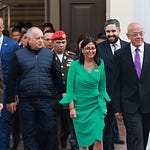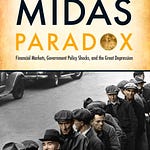For the first time, we had a guest on this week. Inez and I pretty much agree on the Gaza conflict, so we brought on Philippe Lemoine to talk about his own position, which he has written about at his Substack. He believes in a more restrained Israeli approach, hopefully at some point leading to a two-state solution.
I think we all agree that there are only a series of bad options going forward. Philippe’s moral commitments and estimation of the likelihood of success of various paths make him want Israel to try the dovish approach. We discuss questions like whether the current status quo is manageable, whether Hamas poses an “existential” threat to Israel, and whether it can moderate over time. The conversation also focuses on how much the history of the conflict matters. Philippe and Inez go back and forth on what previous events and rounds of negotiations can tell us about the prospects for peace today.
At some point I ask Philippe whether the US would be in some way morally obligated to give land back to the Native Americans if their culture had not been destroyed and they still lived in the country in more substantial numbers, and he surprised me by saying yes! He’s quite the decolonizer. This shows that there are deep moral disagreements here that we only began to scratch the surface of, but maybe we’ll get to another time.
As we realize at the end, it’s very easy to find reasons to be pessimistic with regards to any proposal going forward, and that includes Philippe’s. As we focused on his suggestions today, we’ll probably take the opportunity next week for me and Inez to discuss our own preferred approaches. If you haven’t read my two pieces on the conflict yet, they explain how I’m thinking about the issues involved.
As soon as this conversation was over, I was struck by something odd. We sit there and say Israel should do X or do Y, like we’re their football coach or something, while we never say what the Palestinians should do, but rather discuss what we hope they might be incentivized to do. It would make sense if as Americans (or Frenchmen) we talked only about how we could influence our own governments. But we generally act as if Israel might potentially listen to people like us, or at least listen to the people who might listen to people like us, while the Palestinians are treated as an alien species that we can only understand at a distance rather than hope to influence by convincing them through logical arguments.
I had already been thinking along these lines after reading Yglesias’ piece today on what it actually means to even have a “position” on the Israeli-Palestinian conflict. I think the problem with thinking like this is that while Israel is culturally closer to us than the Palestinians are, it’s still quite distant, and we act as if that is not actually the case. So if Americans were talking about a conflict that the UK was involved in with an Arab state, it would make sense to assume that we have influence primarily over the British position, as us Anglos are all part of the same culture. But when you think about the religious and nationalist concerns that motivate different factions in Israel, it makes me suspect we’re making a mistake by assuming that people like me, Philippe, and Inez have much influence at all. In other words, maybe instead of writing about what Israel should do, I should write about what the Biden administration should do? Or better yet, maybe about what the Republican position should be, since that’s where I, and Inez of course, could potentially exert the most influence? It’s useful to once in a while take a step back and think about what we’re actually doing here.















